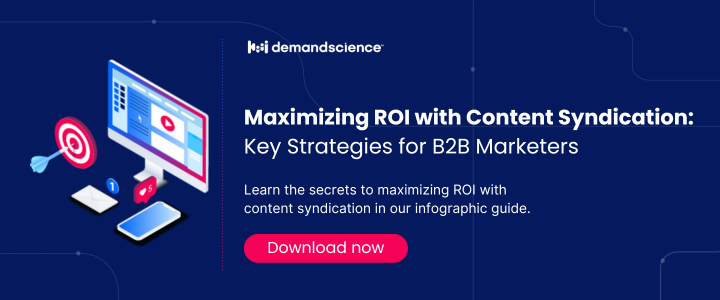
You do not have to be immersed in the B2B landscape to know that information is as valuable as currency for marketers. The strategic dissemination of content can make or break a business’s market presence.
For B2B businesses, the stakes are even higher, as their target audience demands not only relevance and quality but also timeliness in the content they consume. Content distribution (excluding the process of creating content) takes time and resources. It is something that you ought to see through.
Sixty-two percent of email marketing teams take two weeks or more to build an email, and that is simply one facet of a strategic content distribution. This is where content syndication services have emerged as an important boost in ensuring that valuable content reaches the right audience at the right time.
Hence, choosing the right content syndication vendor that will see things through for your business is just essential as choosing content to promote. This article helps you out with a list of what to look for, and even some actual vendors to check out.
What to Look for in a Content Syndication Vendor
With so many available outlets— from free platforms to cost-per-click services— how can you be sure you’re partnering with the right content syndication vendor? Here are six concrete qualities to look for to ensure your demand generation success.
1. High Quality Data
The most important feature any content syndication vendor should offer is high quality data. Look out for methods by which your vendor ensures data accuracy and quality. You should have faith the leads you’re receiving have the most up-to-date information and have been enriched with intent data to help you reach more of the right buyers at the right time.
Achieving rich, accurate data usually involves the following:
- Access to lots of records (over 100 million is a good place to start)
- Title taxonomy checks
- Contact-level buyer intent data
- Contact validation
- Content engagement tracking
- Behavior analytics
- Decisional data
- Technographic insights
Since company and contact info is always changing, this data should also be regularly QA’d through a combination of AI and manual efforts. Updated data will improve segmentation, targeting accuracy, outreach connection rates, and, ultimately, will lead to faster lead generation ROI.
We have a unique tool that helps you measure return on investment as well. DemandScience’s ROI calculator evaluates the key metrics and factors that contribute to your content’s performance and calculates the ROI based on those inputs.
High-quality and actionable data is a powerful complement to your CRM efforts, too. In fact, it gives your CRM greater utility and relevance, giving you the power to approach your marketing and sales activities armed with the confidence of accurate, verified data and true insight.
The opposite is true as well: poor data quality can destroy a marketing campaign and have a significant negative impact on your sales team.
It can also create other risks as well, depending on the type of follow-up you’re performing. For example, actions you take based on flawed data could result in breaches in customer privacy or information, and damage to your own reputation. And don’t forget about the financial costs to your business of using poor-quality data; the average financial impact on U.S. companies annually is around $3.1 trillion.
2. Buyer Analytics
Analyzing your buyers through engagement trends and competitive brand interactions is extremely important. Buyer analytics, as defined by Marketing Evolution, is the “study of data garnered through marketing campaigns in order to discern patterns between such things as how a campaign contributed to conversions, consumer behavior, regional preferences, and creative preferences.” Content syndication can provide this type of data to help enhance your database and improve your follow-up campaigns.
Content syndication vendors can make use of buyer analytics using AI to segment their audiences based on various interaction points. In theory, this process will help provide you better leads with more personalization. However, the catch is the vendor needs to consistently measure their audiences to keep up with changing trends. A great way to see how your content syndication vendor uses buyer analytics is to run two test campaigns with the same persona and see if the quality stays the same or if it drops off between the two test runs.
3. Audience Engagement
A list of contacts is nothing if the contacts never engage. And, in order to be successful with content syndication, you need to reach people who may actually download your offering and become a lead. This fact is why media outlets and other types of publishers try to keep their audiences engaged through regular nurturing and partnered content. In addition to offering content, surveys and other engagement opportunities, the best vendors will regularly analyze contact-level intent signals that are created from domain-level trends, social media triggers, and other channels to derive actionable insights about prospects who are showing interest in solutions like yours.
From a demand generation perspective, a lead that’s engaged with content consumption versus a passive lead can be the difference between closed-won and closed-lost. Depending on the type of media you syndicate, there can be a huge spike in your conversion rates once you start following up with the leads, because those leads are targeted and engaged.
4. Buyer Segmentation
B2B databases tend to be filled with a wide variety of contacts, and whether it’s industry, title, timeframe or any other characteristic, every possible contact is not always qualified for your product, service, or brand. As a demand generation marketer, when researching content syndication services, try to find out if they offer various levels of segmentation in their campaigns. At the very minimum, your potential partner should be able to match your campaign criteria and intended customer profile. It’s even better if they can get more granular using:
- Firmographics
- Geographics
- Demographics
- Competitive Intelligence
- Buyer Intent Signals
If your B2B content syndication platform is able to fill each one of these spots with segmentation options, that’s a great sign. It’s also helpful not to get overwhelmed with the data. Just because you can segment your campaign down to miniscule details, doesn’t mean you should. Try and create campaigns that address your buyer’s needs and take into account what would provide value for them. There is usually a sweet spot between targeting too specifically (and thus shrinking your possible audience size) and targeting too broadly (in which case your offer won’t apply to a lot of the audience). Your content syndication vendor should be able to assist in setting the right targeting parameters.
5. Agility and Campaign Performance
Another important factor to keep in mind when researching content syndication vendors is how they measure campaign performance, and the ways they promote your content. The campaigns they run will always prioritize generating leads over anything else, but you want to make sure their syndication methods won’t damage your brand. Try to ascertain how many times they email your content to their prospects. Also, determine if the leads are generated over the phone or just by email, and talk about how the campaign is evaluated and potentially shifted as it’s running to give you the best chance at getting great leads.
Successful marketing strategies are never “set-and-forget.” The goal of any campaign should be to evaluate and improve results by continually refining your methods. The same goes for working with third-party content syndication vendors. Make sure your potential vendor has the ability to evaluate during your campaign and to be agile.
6. Proven Success
You’ll also want confidence that whatever partner you choose has done this sort of thing before. When looking at different types of content syndication vendors, it’s worth looking at the case studies and reviews that support them. Look at the company’s reach into your specific buyer persona. Ask yourself, are there any crossovers or similarities to what you do? What other companies have used this vendor and left a positive review? Are any of them in your industry?
Successful content syndication vendors should have case studies or use cases readily available, and if they don’t, that should raise a red flag. Ask for case studies if you don’t see them on the vendor’s website.
Paid Content Syndication Vendors, Some Options
Once you’re ready to seek out a content syndication vendor, your six points of evaluation will help you determine your best move as you look into the options. Here are some B2B content syndication platforms you can leverage in order to best support your specific business objective:
Outbrain
Outbrain is a popular discovery and marketing platform that recommends your content to top media outlets like CNN, Time, and ESPN to help drive increased traffic to your website.
According to the platform’s website, Outbrain reaches an audience of more than 550M online users and recommends about 344B pieces of content every month. Considering those numbers, your content is sure to receive extensive exposure. Also, Outbrain features a reader engagement tracker, so you can pinpoint specific parts of your content that resonate best with target audiences.
The downside of Outbrain, however, is that it doesn’t allow publishers to qualify for its revenue-sharing program unless the original content itself is either ad-supported or boasts over 10 million page views. Therefore, if you’re a small-to medium-sized enterprise that aims to generate earnings from blog posts alone, Outbrain might not be the best syndication network for you.
Taboola
The Taboola network mostly serves high-end publishers, including The New York Times, NBC, and CBS. Its content engine helps you determine which sites give you the best engagement from your posts.
As of late, Taboola seems to be having great success in marketing video content, so it’s best to consider the service if your brand is doing more video content marketing soon.
ARC XP is part of The Washington Post’s press release service, which publishes content across a wide network of blog, news, and social media sites all at once. It was “designed by digital storytellers, for storytelling,” according to ARC XP’s Joe Croney.
While ARC XP isn’t particularly useful for your SEO campaigns, it does help generate traffic to your site and increase awareness of or interest in your brand.

Content Syndication by DemandScience
DemandScience’s Content Syndication is a data-driven marriage of content marketing and sales prospecting. With our sophisticated targeting capabilities, we ensure that your content is distributed across various channels and platforms, generating accurate and compliant marketing qualified leads.
Expand the visibility of your digital content across multiple channels and platforms, reaching a wider audience and increasing engagement. Our multi-channel approach ensures accurate and compliant marketing qualified leads through email and phone, maximizing your content’s effectiveness.
With DemandScience content syndication solution, we deliver top-quality opt-in leads with a keen interest in your content. Moreover, our committed Customer Experience Manager maintains constant communication throughout each campaign. This level of assistance surpasses what you would receive from any other lead supplier focused on high-intent leads.
The Goldmine of a Robust Content Syndication Partner
The Competitive Edge in Visibility
In the bustling marketplace of ideas and solutions, gaining visibility is the key. B2B businesses operating in niche markets with highly specific target audiences, face the unique challenge of cutting through the noise to reach potential clients. Content syndication services offer a pathway to increased visibility, pushing content beyond the confines of a company’s own channels and into the broader digital ecosystem where potential clients reside.
Enhancing Credibility Through Association
Content syndication also offers the opportunity to enhance a business’s credibility. By associating a company’s content with reputable platforms and services, businesses can inherit a measure of their authority, lending an air of credibility and trustworthiness to their brand.
The Efficiency of Targeted Reach
Moreover, the efficiency of reaching a targeted audience cannot be understated. Content syndication services specialize in placing content in relevant spaces where the intended audience is already engaged, ensuring that marketing efforts are not wasted on uninterested parties but instead focused on potential clients with a demonstrated interest in the industry.
Choose a Partner That Can Deliver
A successful content syndication partnership is characterized by clear communication, mutual understanding of goals, and alignment in content strategy. DemandScience delivers precision targeting, extensive network, and robust performance analytics, among other features. DemandScience is a leading provider of B2B content syndication.
We have a wide network that ensures broad distribution of your content. With our advanced targeting options, you can reach specific audiences based on industry, job title, and more. This can increase the likelihood of reaching potential customers and generating qualified leads, and ultimately maximizing your ROI.
Let’s amplify your content and get you high-quality leads. Reach out to a DemandScience expert and let’s get started.











